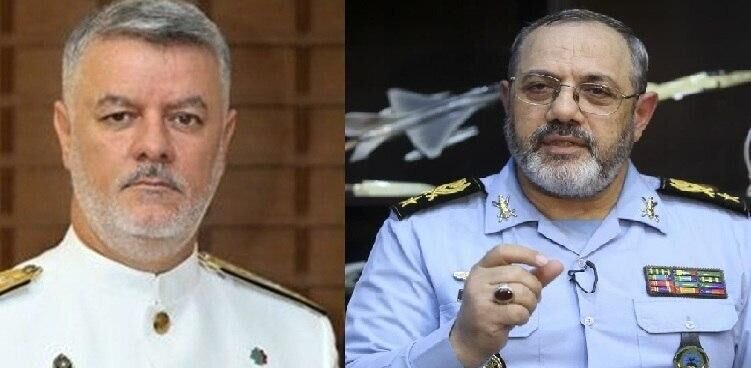Commanders: Enemies would have attacked Iran if country had not been strong

TEHRAN – Commanders of the Islamic Republic of Iran Air Force (IRIAF) and the Navy have highlighted the importance of the Iranian military’s power, saying the enemies would have attacked Iran a hundred times if the country had not been strong enough.
In a TV program broadcast on Saturday night, IRIAF Chief Brigadier General Aziz Nasirzadeh and Navy Chief Admiral Hossein Khanzadi spoke about a range of subjects including the military’s readiness to counter possible threats and the recent joint military exercise held by the Army.
“It is the defensive might that creates sustainable security, and we can have all kinds of developments under sustainable security,” Nasirzadeh said.
Khanzadi also said his forces are ready to respond to any kind of threat, but “we fully respect the territorial integrity of neighboring, friendly countries.”
The Iranian Army on Saturday concluded a three-day joint military exercise, which kicked off in Iran’s southern waters on Thursday.
“They (enemies) are concerned and they are trying to convey their concern, through the media outlets they own, to the nations of the region to make it a collective concern,” says Navy Commander Admiral Khanzadi.
A variety of surface and subsurface submarine units of the Navy, such as destroyers, missile launchers and Tariq, Ghadir and Fateh-class submarines displayed their strength during the last day of the drills, codenamed Zolfaqar-99.
The three-day war game showcased some of the latest achievements of the Army’s units, which were produced to counter the threats by Iran’s enemies.
On Thursday, F-27 and P3F aircraft as well as reconnaissance drones conducted naval patrols to monitor the drills.
Iran’s F-4 fighter-bombers conducted long-range flights from their bases to attend the war game. They destroyed surface targets using optimized precision strike missiles. The F-4 Phantoms stroke at mobile targets at sea and bombed their designated targets on the coast.
On Friday, the Army successfully fired an anti-ship coast-to-sea cruise missile, dubbed “Qader”, at a mock enemy vessel over 200 kilometers from the coast.
Another anti-ship cruise missile, dubbed “Nasr”, was fired from Iran’s Najm missile boat to hit designated target in the southern waters of Iran.
The Army’s first combat drone, named “Kaman-12”, also conducted surveillance operations during the joint military exercise.
‘The exercise almost reached a hundred percent of its goals’
Nasirzadeh said holding the joint exercise was a very complicated task that needed coordination among all units. “The exercise almost reached a hundred percent of its goals,” he said.
He argued that in today’s world, economic, political, and cultural developments are not possible without establishing security.
“We sat around a [negotiating] table with the enemies that we are facing, but you saw how they behaved,” the general said, pointing to the nuclear talks that led to the signing of the 2015 nuclear agreement that the United States unilaterally exited in 2018, only to reimpose sanctions on Iran.
Khanzadi, for his part, said the message of the war game was “power, peace, and security”.
The enemies know that if they act mischievously, they will receive a decisive reaction, he said, adding, “They are concerned and they are trying to convey their concern, through the media outlets they own, to the nations of the region to make it a collective concern.”
“The sea is a continuous arena, and the enemies that threaten Iranian targets are the countries that have expanded their reach in oceans and have entered international waters with bullying,” he remarked.
The admiral said that the only water that is exceptional is the Iranian waters, which the enemies do not dare to approach.
Khanzadi also warned the enemies of the consequences of trying to invade Iran’s territory through water, saying, “We are capable of thwarting the conspiracies.”
MH/PA
